What Is Irony? Types, Examples and Meanings
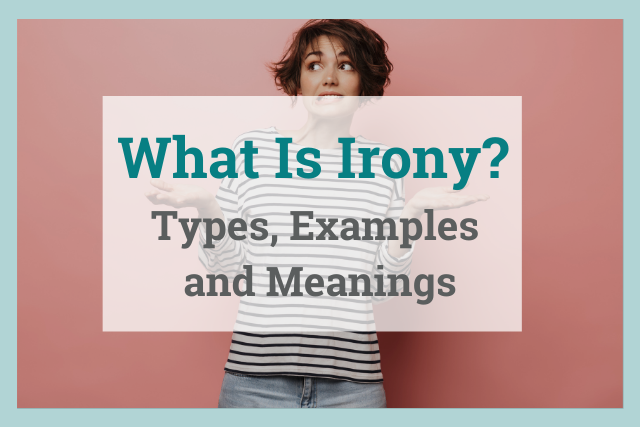
What Is Irony?
Irony is a multifaceted, complicated linguistic concept that’s often distilled to a basic definition for the purposes of getting kids to pass standardized tests: “irony is the opposite of what is expected.” For that purpose, it’s a useful bit of rote recitation; the kind of information that helps you answer a multiple choice question or quick trivia bite.
But, despite being so broad a definition that it’s nearly formless, it doesn’t provide much coverage of what ironic devices are and how we can recognize and use them. The result is that even most native English speakers have more of a gut feeling about what is and isn’t irony, but might struggle to define irony without saying “irony is . . . like . . . when something’s ironic, you know?”
The New American Oxford Dictionary fortunately goes into a bit more detail than your average English-speaker caught unawares by a vocabulary question, presenting three definitions:
1) “The expression of one’s meaning by using language that normally signifies the opposite, typically for humorous or emphatic effect.”
2) “A state of affairs or an event that seems deliberately contrary to what one expects and is often amusing as a result.”
3) “A literary technique, originally used in Greek tragedy, by which the full significance of a character’s words or actions are clear to the audience or reader although unknown to the character.”
Merriam-Webster adds another definition, which also shows Classical Greek influence:
4) “A pretense of ignorance and of willingness to learn from another assumed in order to make the other’s false conceptions conspicuous by adroit questioning—also called Socratic irony.”
Each of these definitions corresponds to one of these four types of irony:
- Verbal
- Situational
- Dramatic
- Socratic
What Is Verbal Irony?
Since this is an article about writing, let’s start with verbal irony—the type of irony that you do with wordplay. Since repetition is the mother of memory, here’s the definition again (courtesy of the New Oxford American Dictionary):
-“The expression of one’s meaning by using language that normally signifies the opposite, typically for humorous or emphatic effect.”
Think of verbal irony as sarcasm’s deeper, less malignant cousin.
While sarcasm is often intended to criticize a target, verbal irony isn’t so aggressive. It’s like the difference between laughing at and laughing with someone. With verbal irony, the audience is in on the joke, rather than the butt of the joke. Let’s look at some examples of verbal irony vs. sarcasm in the context of two people standing outside in a torrential downpour.
Verbal irony: -”Hey, nice weather we’re having.” -”Yeah, I might hit the beach later.”
See? In this exchange, both parties are in on the joke. They both understand that the weather sucks, which is such an obvious fact that it’d be redundant to say “Wow, pretty rainy, huh?” Instead, each party remarks on the obviously inclement weather using verbal irony. It adds just enough complexity and humor to the comment so as not to be a totally boring claim, and to avoid directly complaining. Note that verbal irony isn’t necessarily ha-ha funny (kind of like improv).
Sarcasm: -”Man, I’m soaked through my tee-shirt.” -”Yeah, way to wear a raincoat, genius.”
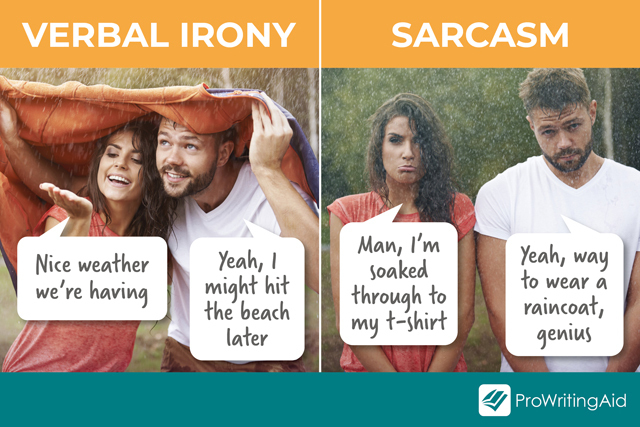
See how the second person in this exchange is attacking the first person? Don’t be misled by the term “genius” here—it is not sincere. If you read the subtext and understand sarcasm, you’ll understand that what person number two is actually saying here is “Wear a raincoat when it’s raining, moron.”
So, to reiterate: there is common ground between verbal irony and sarcasm, in that they both express meaning by using language that would signify the opposite of the speaker’s intent for emphasis, humor, or both. Sarcasm just tends to be meaner, and more clearly targets the person being addressed.
Do note that sarcasm, like verbal irony, can also be playful and not particularly malignant. Many English-speakers show affection via feigned aggression, and that can include sarcasm. Still, playful sarcasm remains sarcasm, as opposed to verbal irony, because the addressee is the target. Whether the goal is playful ribbing or total social-emotional devastation, sarcasm is a device with a target.
Verbal irony is more about creating contradictory subtext to convey meaning in unconventional ways than it is about hurting anyone’s feelings.
What Is Situational Irony?
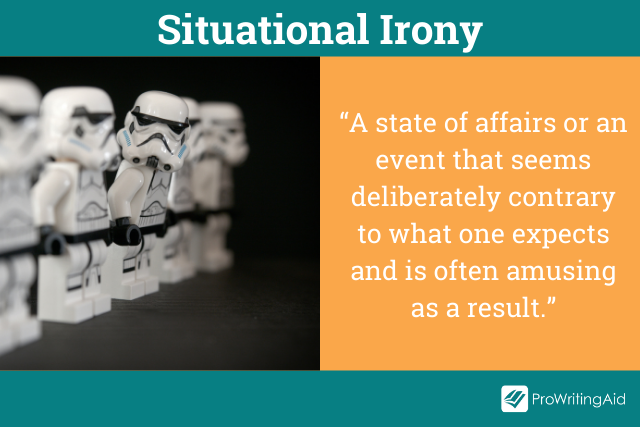
Once again, situational irony is defined as:
“A state of affairs or an event that seems deliberately contrary to what one expects and is often amusing as a result.”
This is the meaning that most closely resembles the basic “irony is the opposite of what is expected” definition. Situational irony subverts expectations, contradicting an audience’s predictions—predictions that a reader makes based on their experience with more typical, formulaic prose that adheres to genre tropes and cliches.
Part of the trick with subverting audience expectations is to first establish a familiar pattern that leads the audience to predict the sort of conclusion they’re used to seeing. Situational irony suggests a typical scenario, then pulls a twist that surprises the reader (or viewer). It’s an important storytelling device that needs to follow some fundamental structural rules in order to be considered comprehensible and appealing to most readers.
Some of these rules are harder to bend or break than others. For example, the beginning, middle, and end narrative structure , which features a climax and conclusion, is a well-worn but also well-proven way to craft a story that people can intuitively understand. You can subvert these basics, and you might have to if you plan on writing mind-bending time-travel sci-fi, but the further you stray from the formula, the more likely you are to alienate some of your audience. Consider Christopher Nolan’s Inception. Most will agree that the movie was a mind-trip, but beyond that, opinion seems split between people who thought it was compelling, and those that found it convoluted and difficult to follow. Making your writing logical and easy to follow can be difficult, but ProWritingAid's Transition Report is here to help make the process a little easier.

However, if you play things too safe and stay entirely within the ruts of writers who came before you, you risk boring your audience. Situational irony allows for the best of both worlds: a grounded narrative structure that speaks to the way we understand stories and does not attempt to reinvent the wheel, but that includes twists and subversions that may surprise the reader—a marriage of the familiar with the unfamiliar.
Let’s look to pop fiction for some examples of situational irony (spoiler warning, since we’re going to be dealing with some plot twists here):

The Sixth Sense
The first and most blatant example of situational irony in film that comes to mind is The Sixth Sense. A child psychologist is working with a troubled boy who can communicate with the dead. Plenty of movies had covered the “adult tries to figure out spooky kid” story before the movie came out in 1999. Still, the story was unique, and not because director M. Night Shyamalan totally reinvented the wheel. Instead, he took advantage of the audience’s familiarity with the formula to throw them off the scent of the big twist—that the child psychologist was just another dead person that the boy could talk to. This bit of situational irony made the movie unique, despite the fact that it otherwise followed convention.
Alien
Ridley Scott’s Alien is another great example. Given the benefit of several decades’ worth of hindsight, it’s obvious that Sigourney Weaver’s character, Ripley, is the protagonist of Alien and its sequels. But for the first act of the 1979 space horror flick, it’s unclear who among the Nostromo’s crew is actually the protagonist. Captain Dallas probably seemed the most obvious candidate: he’s in charge, he hatches the plan for fighting the alien, and he looks the part of the late 1970s masculine hero (bearded and everything). But then he’s killed by the alien, and we realize Sigourney Weaver was the one who would end up the hero. Oh, and one of the crew was a secret android the whole time. What originally seemed to be a relatively masculine sci-fi monster movie evolves seamlessly into a female-driven film and series that deals heavily in themes of fertility and motherhood. This is what makes the story unique and seminal, and often superior to its copycat films that forget to subvert expectations in a fresh way.
Star Wars
Or, while we’re in the endless void of space, how about Darth Vader telling Luke Skywalker that he’s his father? That was not what audiences in 1980 expected would happen after Vader cuts off Luke’s hand (which was also unexpected). Not only did this revelation subvert audience expectations and make Darth Vader far more interesting, it built energy for the plot to move forward and find its true themes: family, legacy, fear, and self-reflection. That’s situational irony, and it can elevate a boring story about “good guy vs. evil guy” into something profound, like “good guy (who kissed his own sister) vs. his corrupted father.”
Lamb to the Slaughter
If you’re looking for a slightly more literary example, see the Roald Dahl short story, Lamb to the Slaughter. Spoilers, of course: in the story, a wife murders her husband by bludgeoning him with a frozen leg of lamb. When the investigating detectives come around, the wife cooks the lamb and feeds it to them for dinner. The situational irony here: the murderer has disposed of the murder weapon by feeding it to the homicide detectives. (This short story was published in 1953, well before Hannibal Lecter taught us all to never go to a murder suspect’s house for dinner.)
What Is Dramatic Irony?
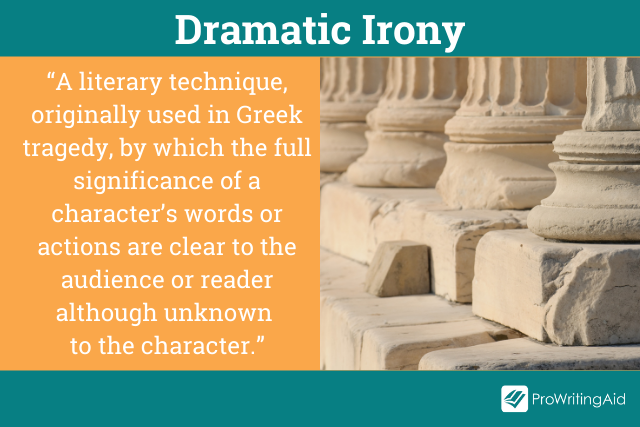
“A literary technique, originally used in Greek tragedy, by which the full significance of a character’s words or actions are clear to the audience or reader although unknown to the character.”
Or, in fewer words: dramatic irony is when the audience knows something that a character doesn’t.
An early and prominent example of dramatic irony is Sophocles’ Oedipus Rex. Here, Oedipus learns of a prophecy that he would kill his father and sleep with his mother. Learning his fate, Oedipus tries as hard as he can to avoid it, which is complicated by the fact that he thought he never knew his real parents. As the play goes on, the audience learns first what Oedipus cannot see for himself: that he has already fulfilled this prophecy, having unknowingly killed his father in a road rage incident, and having already fathered two sister-daughters with the woman who abandoned him to exposure as an infant. Only at the end does Oedipus realize what we (and Jocasta, his mother-wife) have already learned. That’s when he gouges out his own eyes, thereby matching physical blindness to the metaphorical blindness that prevented him from seeing the truth in his own prophecy (and the futility of trying to avoid it in the first place).
Shakespeare’s Romeo and Juliet is another: during the final scene, they employ dramatic irony as the audience knows that Juliet has only taken a sleeping potion that makes her appear dead. Romeo, believing her to be dead (and unaware of how to check for a pulse, presumably), swallows some real poison, killing himself.

More generally, the first act of any horror film or fiction where the characters do not yet realize they’re in a horror movie. Perhaps a family has just signed papers purchasing an old mansion, and the title of the film is Chateau de Killhouse. While they cheerfully unpack boxes, we, the audience, are fully aware that at least 90 minutes of horror await them. Dramatic irony separates us from the characters we’re observing, highlighting the difference between their limited awareness and our relative omnipotence. That we cannot tell the characters what we already know creates tension, and tension is good.
What Is Socratic Irony
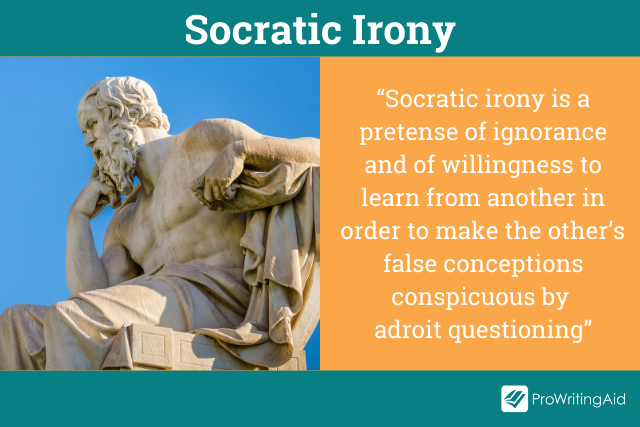
Last and, honestly, least (unless you’re a professor of philosophy) is Socratic irony. Once again:
“[Socratic irony is a] pretense of ignorance and of willingness to learn from another assumed in order to make the other’s false conceptions conspicuous by adroit questioning—also called Socratic irony.”
Socratic irony is a big part of the Socratic method (go figure). In the Socratic method, a teacher plies a student with rhetorical questioning that’s designed to stimulate new lines of thought and eliminate potential hypotheses. Part of that method basically involves tricking your debate opponent into thinking they’re much smarter than you are. The hopeful result is that your opponent begins to underestimate you and overestimate themselves. By the time they realize you were feigning idiocy the whole time, you’ve sprung your logical trap. It’s the same idea that’s behind pool sharking.
Why is this “irony”? Because the person practicing Socratic irony is not saying what they mean, albeit to a constructive end (separating it from pure dishonesty or sarcasm).
Closing Thoughts
Hopefully this post has clarified irony for you. If it's only made you more confused, that would probably be ironic. When in doubt, try connecting your situation to one of the four dictionary definitions listed above.